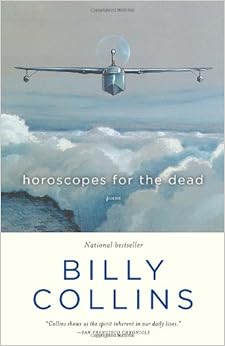Review: Horoscopes for the Dead, poems by Billy Collins
 |
| Horoscopes for the Dead, by Billy Collins Random House, 2011 | 103pp |
Published in 2011, Horoscopes for the Dead is a personal and deeply relatable collection dedicated to remembering persons and things lost to time. The first poem, "Grave," sets the tone and establishes for the reader a somewhat sardonic humor with recurrent images of cemeteries, empty chairs and mossy shade. Combined with hyperbole, this humor acts as a mechanism to both show love, and deflect pain.
While there is no thru-line, per say, the feeling of loss and longing is evident throughout the book. The titular poem - which opens the second part of the collection - is the most resounding in terms of feeling and relatability. The idea that we mark someone's presence even after they're gone, and that, in loss, we sometimes live in parallels of what-ifs - ghosts of possibilities, as it were - is a confessional token of humanity that its oft written about, but so rarely portrayed as honestly as Collins did here. It reminded me of a Facebook page that I follow - a memorial page for a relation of mine who passed away suddenly a couple of years ago. Gone but ever-immortalized online where we all wait for her next update, regardless of her absence.
That being said, the collection falls short of great in my humble opinion. The deviances into Florida are offensive to me simply because of my feelings about Florida, but are otherwise digestible. But there are some pieces (i.e. "Table Talk," "Lakeside," and "Returning the Pencil to Its Tray") that didn't seem to fit - they're clunky and awkward and resemble poems in as much as they are structured like one, but otherwise have no internal rhythm, neither buoyancy nor gravity, and which simply do not mix well with the others, but which the author deemed appropriate for this collection despite every instinct that I personally would have otherwise. Come for the poems about death and loss, but don't get tricked into staying for the less worthy off-topic meanderings of the modern poet.

Comments
Post a Comment
Any and all feedback is welcome - thanks for taking the time!